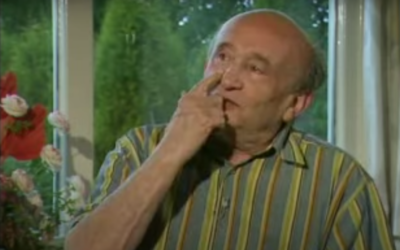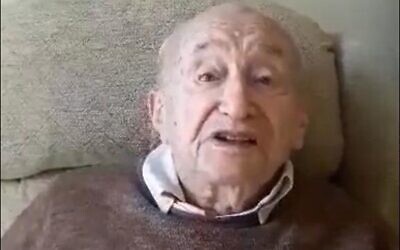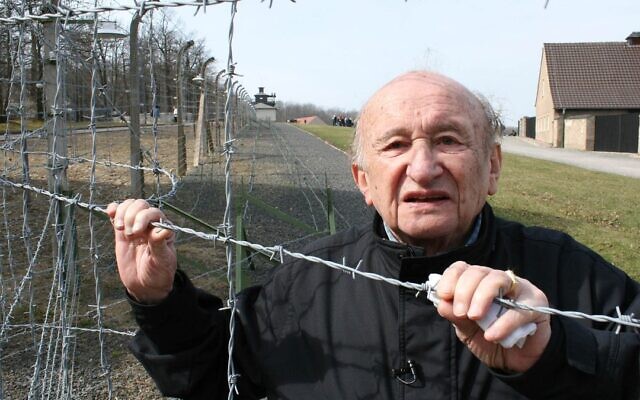Death of Holocaust survivor, 96, one of first orphans to come to Britain
Jack Aisenberg was of the one in ten who lived through a death march as Germans fled Allies - he went on to create a successful luggage business with two other survivors
Ten years ago, Jack Aizenberg said: “When I go to heaven I will see my family.
“I cannot prove it but I know it’s going to happen because they are waiting for me. They didn’t forget me.”
Now he is reunited with the mother, father and little brother who were exterminated – just for being Jewish.
Jack, who has died aged 96, was speaking in 2012 after making an emotional pilgrimage back to his home town of Staszow in Poland as part of an ITV’s series, Strictly Kosher, which tracked the lives of Manchester’s Jewish community.
With tears streaming down his face, Jack, then 86, said of his family: “They were murdered.
“My brother was only nine years old. He was a Jew – that was his guilt! What kind of world is that?”
Holocaust Educational Trust chief executive Karen Pollock said: “We are deeply saddened to hear of the passing of Jack Aizenberg. Born in Staszow in Poland, Jack was a survivor of multiple labour camps, Buchenwald and Terezin concentration camps,. He came to the UK as one of the Boys, brought to Windermere for treatment and recuperation. He was a beloved member of the survivor community and our thoughts and prayers are with his family.”

Jack was himself among 600 people forced on a 100-mile death march as American troops advanced into Germany in the closing days of the Second World War. Jack was also one of the one in 10 who survived. But he was left with no home and no family.
He returned to the camps where he nearly died 10 years ago – and the riverbank where he last saw his family alive in November, 1942, as Jews were force-marched to the death camps.
His father, Ajzyk, had been told he could get a job in the barracks but told his eldest son, then 16, to hide with his uncles and cousins.
“I didn’t know anything about life – I just thought it was a pleasant adventure,” Jack told the documentary. But it only took the Nazis 10 days to find his hiding place in an attic along with 30 other Jews.
Jack was put to work as a slave labourer, 50 miles away in Kielce. On one occasion he was loading cabbages.
“I had never seen cabbages like them, beautiful round footballs and I put one in my hand and started staring at it,” he said. “Then I got hit on the head by a German soldier. He shouted ‘work!’. I realised I was not at a holiday camp.”
Another job in charge of a little hut handing out tools saved his life. “When the lorries came for petrol and the drivers walked away, I stole their food,” he said. “If they had caught me I would have been shot on the spot.”
But he was soon taken to Buchenwald concentration camp.
“From then on there was no food, just starvation,” he says.

“The smell of burnt flesh was horrific. The crematorium was going 24 hours a day to burn the dead. Every morning they would use a big wheelbarrow and take the bodies to the crematorium. You become immune to it.
“One day they gave us all a little piece of soap with initials on it like you get in hotels. It stood for ‘pure Jewish fat’.
“I didn’t work, just starved and thought about food and watched myself get thinner.
“But I was still young and had a will to live. If you gave up, that was it.”
After a few months, Jack was moved to a weapons factory in the shadow of Colditz Castle.
But as the Allied advance continued he was put on a two-week death march to Theresienstadt concentration camp in Czechoslovakia.
“It took two weeks,” he says. “There were 600 of us when we started, but only 60 survived.
“If you couldn’t walk you were shot, if you fell down you were shot. I was thinking ‘Why are they dragging this poor beggar across Europe, shuffling along’. Maybe that kept me alive.
“They gave us water but no food.
“We stopped every night at a farm and at some farms we got a potato. We also started eating grass.
“After a week we stopped at a factory. I found a dried-out pea. It had probably been on the floor for six months, but I was excited.
“I decided to boil it and all the boys helped me start a fire, using a little bit of timber from the ceiling.
“The crowd of survivors gathered around watching, and I could see their eyes popping out. I was nervous, ‘what if they pinched my pea?’
“I poured out the water and cut it into four to make it last longer.” They got no food for another week.
By the time the Germans surrendered, he was near death. “I think another day and I would have been dead,” he said. “I was dying, but didn’t care.”
Then he heard the sound of accordions and realised the camp had been liberated by the Russians.
The British Government agreed 1,000 orphaned children under 16 could enter the country. Jack was among the first 300, flown to Windermere in Cumbria to recuperate for six months.
“I had to lie about my age,” he said. “I was 19 but we had no papers. When I got on the fear and the hunger was gone.
“When we arrived in Britain it was like arriving in paradise.”
With just £30, Jack went on to create a successful luggage business with two other Holocaust survivors in Manchester. He was married for 46 years to Rhona by the time of the documentary – the couple have two children.
He said: “Being a survivor has taught me something. I have got more patience, more tolerance, more understanding of suffering and I really hate mistreatment of human beings.
“I came here without a penny and now I have a few pennies,” he laughed, adding: “and a very, very special wife.
“England is paradise. I wish the whole world is like the English. I am so grateful to this country.
“I cannot believe that I nearly died of starvation and now I watch my weight!”
“I’ve seen two worlds. I’ve been in hell and in paradise.”

Thank you for helping to make Jewish News the leading source of news and opinion for the UK Jewish community. Today we're asking for your invaluable help to continue putting our community first in everything we do.
For as little as £5 a month you can help sustain the vital work we do in celebrating and standing up for Jewish life in Britain.
Jewish News holds our community together and keeps us connected. Like a synagogue, it’s where people turn to feel part of something bigger. It also proudly shows the rest of Britain the vibrancy and rich culture of modern Jewish life.
You can make a quick and easy one-off or monthly contribution of £5, £10, £20 or any other sum you’re comfortable with.
100% of your donation will help us continue celebrating our community, in all its dynamic diversity...
Engaging
Being a community platform means so much more than producing a newspaper and website. One of our proudest roles is media partnering with our invaluable charities to amplify the outstanding work they do to help us all.
Celebrating
There’s no shortage of oys in the world but Jewish News takes every opportunity to celebrate the joys too, through projects like Night of Heroes, 40 Under 40 and other compelling countdowns that make the community kvell with pride.
Pioneering
In the first collaboration between media outlets from different faiths, Jewish News worked with British Muslim TV and Church Times to produce a list of young activists leading the way on interfaith understanding.
Campaigning
Royal Mail issued a stamp honouring Holocaust hero Sir Nicholas Winton after a Jewish News campaign attracted more than 100,000 backers. Jewish Newsalso produces special editions of the paper highlighting pressing issues including mental health and Holocaust remembrance.
Easy access
In an age when news is readily accessible, Jewish News provides high-quality content free online and offline, removing any financial barriers to connecting people.
Voice of our community to wider society
The Jewish News team regularly appears on TV, radio and on the pages of the national press to comment on stories about the Jewish community. Easy access to the paper on the streets of London also means Jewish News provides an invaluable window into the community for the country at large.
We hope you agree all this is worth preserving.






















